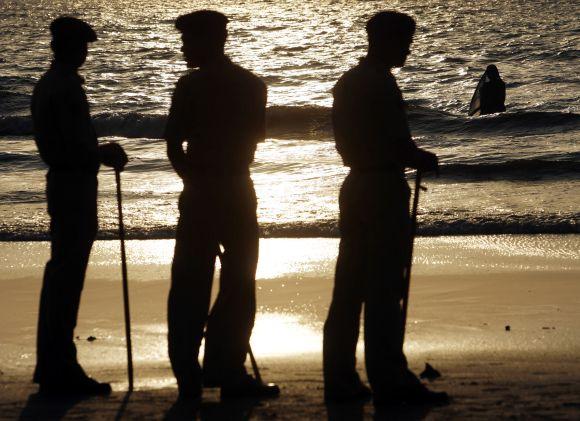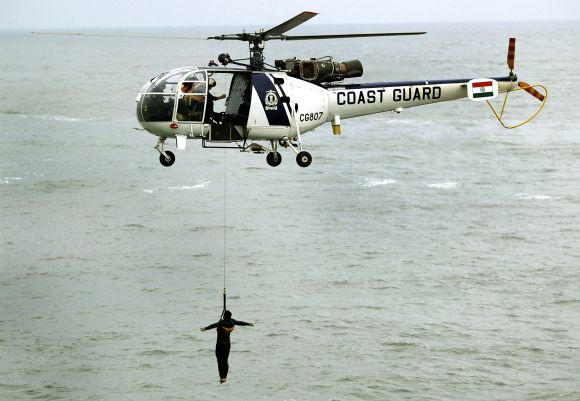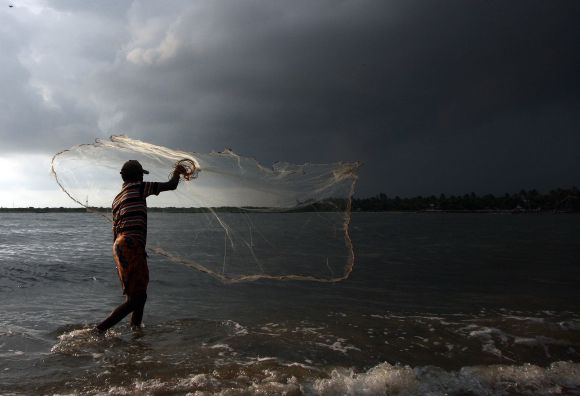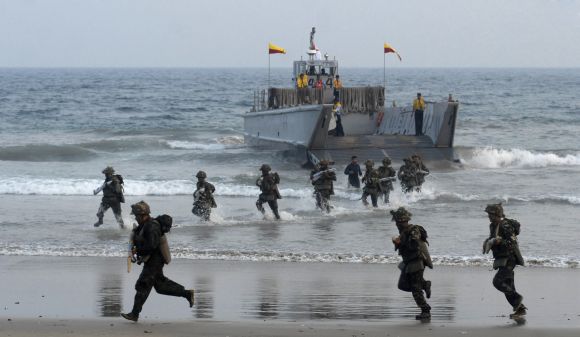
While maritime security continues to be one of India's biggest headaches, de-motivation and fatigue that has set in the officers with the duty to man the coasts leading to lack of coordination with fishermen, are making matters worse. Vicky Nanjappa reports.
Human intelligence is what India seems to rely upon in order to thwart a sea-borne attack. While a plan had been drawn out and many fishermen roped in for the job, a quick look at the situation on the ground reveals that this project has not really taken off as the country would have hoped.
To make matters worse, there is a great deal of boredom, fatigue and de-motivation setting in among the maritime security officers which is only making the job even harder.
The 26/11 attacks in Mumbai woke the nation up to the threat of a maritime-based attack. Now the Union government has once again directed all the coastal states to step up security.
The alert comes in the wake of an Intelligence Bureau warning which had cautioned of a sea-borne attack by some terrorist groups. The IB warning points towards a Lashkar-e-Tayiba attack which is most likely to be carried out by January 13 next year.
Maritime security is probably India's biggest headache. While one looks at the various warnings and alerts that the intelligence has been receiving, a majority of them point towards an attack from the sea.
Please ...

Prime Minister Manmohan Singh had said that a comprehensive scheme of maritime domain which would be led by the Indian Navy would help improve coastal vigilance.
In addition to this he also pointed out that better monitoring would also go a long way.
Sources involved with maritime security tell rediff.com that the equipment and other aspects for maritime security is not much of an issue. After 26/11 there has been a better system in place, "but what we lack is human intelligence".
"The fishermen who know the seas well are the ones that we need to rely on the most to report any suspicious activity. Manning the coast with security forces is an impossible task since there is a lot of manpower that is involved in it and hence the concept of human intelligence was suggested and also implemented," sources point out.
"The problem that is being faced is the lack of coordination between the human intelligence wing and the maritime security wing. Officials picked from the police force to man the coast are complaining that they have a very dull job on hand. The issue is that theirs' is a non-executive posting and does not draw the same perks and interest that a police official in an executive posting would have," sources note.
Please ...

An officer, who is part of the maritime security, says that the exposure is very less and there is very little interaction with the general public. "Our existence is not known to anyone unlike the rest of the police officials in charge of law and order. We have also found that we have not much recognition within the force as well and this has led to a great deal of frustration and the duty on hand does not give a job satisfaction. To make matters worse the incentives are less compared to the rest of the officers," the officer says.
"This has led to the lack of interaction with the fishermen who form part of the human intelligence chain. This has had its effects on the fishermen who were enthusiastic at first to report matters, but the lack of coordination has also left them less interested in their job. In most cases, information is being passed on for the heck of it and more often than not it has not found to be actionable in nature."
Some senior officials say that such grievances need to be addressed. "Long postings on the coast need to be avoided as it does lead to a great deal of fatigue and boredom. They will need to think of a better re-shuffle policy and also better the perks so that officials do not try and avoid that job," a senior official says.
Please ...

Post 26/11 attacks there were a lot of measures taken to improve maritime security. India has a fishing fleet which exceeds 2 lakhs and till date there has not been a uniform manner in which these vessels have been registered, experts point out.
It is also pointed out that on paper the security system looks very good. Setting up Joint Operation Centres in the three naval commands and also the Multi Agency Centre have helped address a lot of the problems. However, these functions are operational and come in handy at the time of an attack.
But the more crucial point is the intelligence and thanks to the fatigue among some officers and the lack of interest among the human intelligence wing has created a great deal of problems.
The government of India has allocated a dedicated budget of Rs 260 crore to tackle this issue taking into consideration that terrorist groups would continue to use the sea route to target India in bigger attacks.
Security experts say that India's biggest threat continues to be the Lashkar-e-Tayiba and the group has shown its capabilities on the sea. It is a misconception that they will use bigger vessels to stage an attack on India and what we need to look out for are the smaller boats on which they would ferry their men.
"Hence it becomes extremely important that there is proper coordination between the local officers and the fishermen who can spot anything fishy so that an attack could be thwarted," experts add.
The Lashkar dossier does indicate that this is a group which has the best maritime capabilities today. They have speed boats and sea scooters at their disposal and also a dedicated team to operate such equipment.
...